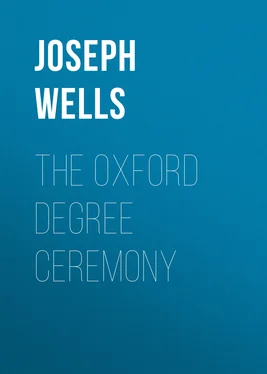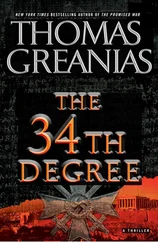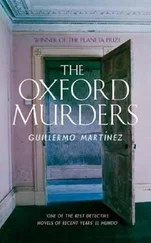Joseph Wells - The Oxford Degree Ceremony
Здесь есть возможность читать онлайн «Joseph Wells - The Oxford Degree Ceremony» — ознакомительный отрывок электронной книги совершенно бесплатно, а после прочтения отрывка купить полную версию. В некоторых случаях можно слушать аудио, скачать через торрент в формате fb2 и присутствует краткое содержание. Жанр: foreign_antique, foreign_edu, на английском языке. Описание произведения, (предисловие) а так же отзывы посетителей доступны на портале библиотеки ЛибКат.
- Название:The Oxford Degree Ceremony
- Автор:
- Жанр:
- Год:неизвестен
- ISBN:нет данных
- Рейтинг книги:5 / 5. Голосов: 1
-
Избранное:Добавить в избранное
- Отзывы:
-
Ваша оценка:
- 100
- 1
- 2
- 3
- 4
- 5
The Oxford Degree Ceremony: краткое содержание, описание и аннотация
Предлагаем к чтению аннотацию, описание, краткое содержание или предисловие (зависит от того, что написал сам автор книги «The Oxford Degree Ceremony»). Если вы не нашли необходимую информацию о книге — напишите в комментариях, мы постараемся отыскать её.
The Oxford Degree Ceremony — читать онлайн ознакомительный отрывок
Ниже представлен текст книги, разбитый по страницам. Система сохранения места последней прочитанной страницы, позволяет с удобством читать онлайн бесплатно книгу «The Oxford Degree Ceremony», без необходимости каждый раз заново искать на чём Вы остановились. Поставьте закладку, и сможете в любой момент перейти на страницу, на которой закончили чтение.
Интервал:
Закладка:
(3) The Proctorial Charge.
The third part of the ceremony is the charge which is delivered, usually by the Junior Proctor, to the candidates for the degree. Each receives a copy of the New Testament from the Bedel, on which to take his oath. The charge to all candidates for a doctorate or for the M.A. is:—
'Vos dabitis fidem ad observandum statuta, privilegia, consuetudines et libertates istius Universitatis. Item quod quum admissi fueritis in domum Congregationis et in domum Convocationis, in iisdem bene et fideliter, ad honorem et profectum Universitatis, vos geretis. Et specialiter quod in negotiis quae ad gratias et gradus spectant non impedietis dignos, nec indignos promovebitis. Item quod in electionibus habendis unum tantum semel et non amplius in singulis scrutiniis scribetis et nominabitis; et quod neminem nominabitis nisi quem habilem et idoneum certo sciveritis vel firmiter credideritis.'
('You will swear to observe the statutes, privileges, customs and liberties of your University. Also when you have been admitted to Congregation and to Convocation, you will behave in them loyally and faithfully to the honour and profit of the University. And especially in matters concerning graces and degrees, you will not oppose those who are fit or support the unfit. Also in elections you will write down and nominate one only and no more at each vote; and you will nominate no one but a man whom you know for certain or surely believe to be fit and proper.')
To this the candidates answer 'Do fidem'.
The charge to candidates for the B.A. or other lower degrees is much simpler:—
'Vos tenemini ad observandum omnia statuta, privilegia, consuetudines, et libertates istius Universitatis, quatenus ad vos spectent' (as far as they concern you).
This charge, which is of course the first part of the charge to M.A.s, goes back to the very beginnings of University ceremonial; the latter part of the charge to M.A.s is modern, and takes the place of the more elaborate oaths of the Laudian and of still earlier statutes. By these a candidate bound himself not to recognize any other place in England except Cambridge as a 'university', and especially that he 'would not give or listen to lectures in Stamford as in a university'. 6 6 This delightful piece of English conservatism was only removed from the statutes in 1827. It refers to the foundation of a university at Stamford in 1334 by the northern scholars who conceived themselves to have been ill-treated at Oxford; the attempt was crushed at once, but only by the exercise of royal authority.
[Pg 14] There was also a special direction that each candidate should within a fortnight obtain the dress proper for his degree, in order that 'he might be able by it to do honour to our mother the University, in processions and in all other University business'. It is a great pity that this latter part of the old statutes was ever omitted.
The candidates for a degree in Divinity, whether Bachelors or Doctors, are charged by the Senior Proctor; the senior of them makes the following declaration, taken from the thirty-sixth canon of the Church of England (as revised and confirmed in 1865):
'I, A.B. , do solemnly make the following declaration. I assent to the Thirty-Nine Articles of Religion and to the Book of Common Prayer and of the ordering of bishops, priests, and deacons, and I believe the doctrine of the United Church of England and Ireland, as therein set forth, to be agreeable to the Word of God.'
The Senior Proctor then says to the other candidates:—
'Eandem declarationem quam praestitit A.B. in persona sua, vos praestabitis in personis vestris, et quilibet vestrum in persona sua.'
('The declaration which A.B. has made on his part, you will make on your part, together and severally.')
(4) The Admission by the Vice-Chancellor.
When the candidates have duly taken the oath, the last and most important part of the ceremony is performed.
The candidates for any Doctorate, except the new 'Research' ones, or for the M.A., kneel before the Vice-Chancellor; the Doctors are taken separately according to their faculties, then the M.A.s in successive groups of four each; the Vice-Chancellor, as he admits them, touches them each on the head with the New Testament, while he repeats the following form:—
'Ad honorem Domini nostri Jesu Christi, et ad profectum sacrosanctae matris ecclesiae et studii, ego auctoritate mea et totius Universitatis do tibi ( vel vobis) licentiam incipiendi in facultate Artium ( vel facultate Chirurgiae, Medicinae, Juris, S. Theologiae) legendi, disputandi, et caetera omnia faciendi quae ad statum Doctoris ( vel Magistri) in eadem facultate pertinent, cum ea completa sint quae per statuta requiruntur; in nomine Domini, Patris, Filii, et Spiritus Sancti.'
('For the honour of our Lord Jesus Christ, and for the profit of our holy mother, the Church, and of learning, I, in virtue of my own authority and that of the whole University, give you permission to incept in the Faculty of Arts (or of Surgery, &c.), of reading, disputing, and performing all the other duties which belong to the position of a Doctor (or Master) in that same faculty, when the requirements of the statutes have been complied with, in the Name of the Father, the Son, and the Holy Ghost.')
This venerable form goes back (p. 26 Конец ознакомительного фрагмента. Текст предоставлен ООО «ЛитРес». Прочитайте эту книгу целиком, купив полную легальную версию на ЛитРес. Безопасно оплатить книгу можно банковской картой Visa, MasterCard, Maestro, со счета мобильного телефона, с платежного терминала, в салоне МТС или Связной, через PayPal, WebMoney, Яндекс.Деньги, QIWI Кошелек, бонусными картами или другим удобным Вам способом.
) to the beginning of the fifteenth century, and is probably much older; the only change in it is the omission at the beginning of 'et Beatae Mariae Virginis'. Modern toleration has provided a modified form for use in cases of candidates for whom the full form is theologically inappropriate, but this is rarely used.
Change of Gowns.
The ceremony of the licence is now complete; but before the B.A.s are admitted, the Doctors first, and then the Masters in their turn, retire outside, and don 'their appropriate gowns and hoods'. They receive these from those who were once their college servants, and the right of thus bringing gown and hood is strictly claimed; nor is this surprising, as unwritten custom prescribes that the gratuity must be of gold. The newly created Doctors or Masters then come back, with the Bedel leading the procession, and 'make a bow' to the Vice-Chancellor, who usually shakes hands with the new Doctors; they are then conducted to a place in the raised seats behind and around his chair, from which they can watch the rest of the proceedings. The M.A.s either leave the house or join their friends among the spectators.
The ceremony of admitting B.A.s is much simpler. As in the case of the Masters, they are presented by their college Dean; the form of presentation is:
'Insignissime Vice-Cancellarie, vosque egregii Procuratores, praesento vobis hunc meum scholarem ( vel hos meos scholares) in facultate Artium, ut admittatur ( vel admittantur) ad gradum Baccalaurei in Artibus.'
The charge is then given by the Junior Proctor (see pp. 12 and 13). After this the candidates are, without kneeling, admitted by the Vice-Chancellor, in the following words:
'Domine ( vel Domini), ego admitto te ( vel vos) ad gradum Baccalaurei in Artibus; insuper auctoritate mea et totius Universitatis, do tibi ( vel vobis) potestatem legendi, et reliqua omnia faciendi quae ad eundem gradum spectant.'
Читать дальшеИнтервал:
Закладка:
Похожие книги на «The Oxford Degree Ceremony»
Представляем Вашему вниманию похожие книги на «The Oxford Degree Ceremony» списком для выбора. Мы отобрали схожую по названию и смыслу литературу в надежде предоставить читателям больше вариантов отыскать новые, интересные, ещё непрочитанные произведения.
Обсуждение, отзывы о книге «The Oxford Degree Ceremony» и просто собственные мнения читателей. Оставьте ваши комментарии, напишите, что Вы думаете о произведении, его смысле или главных героях. Укажите что конкретно понравилось, а что нет, и почему Вы так считаете.











